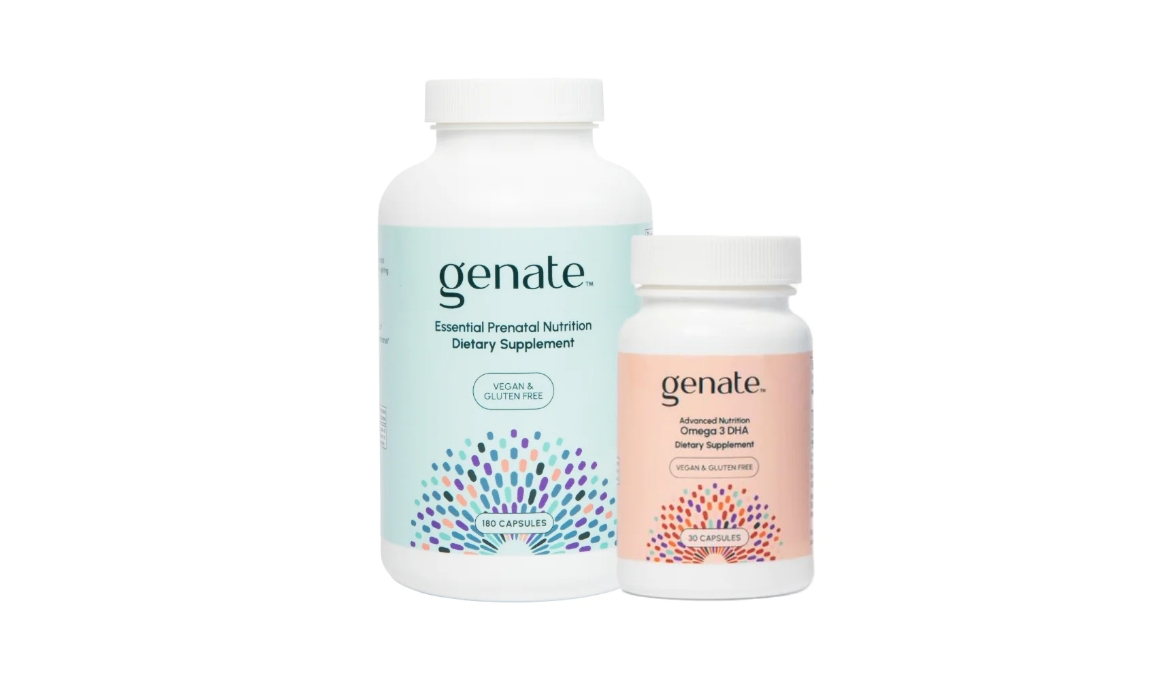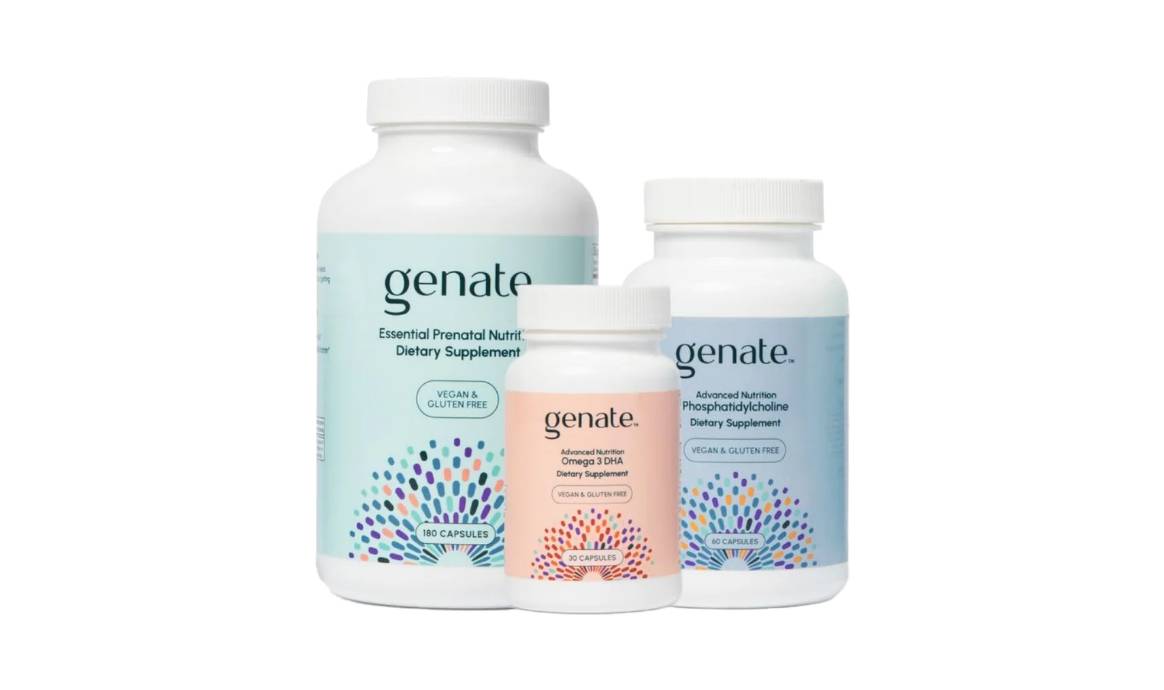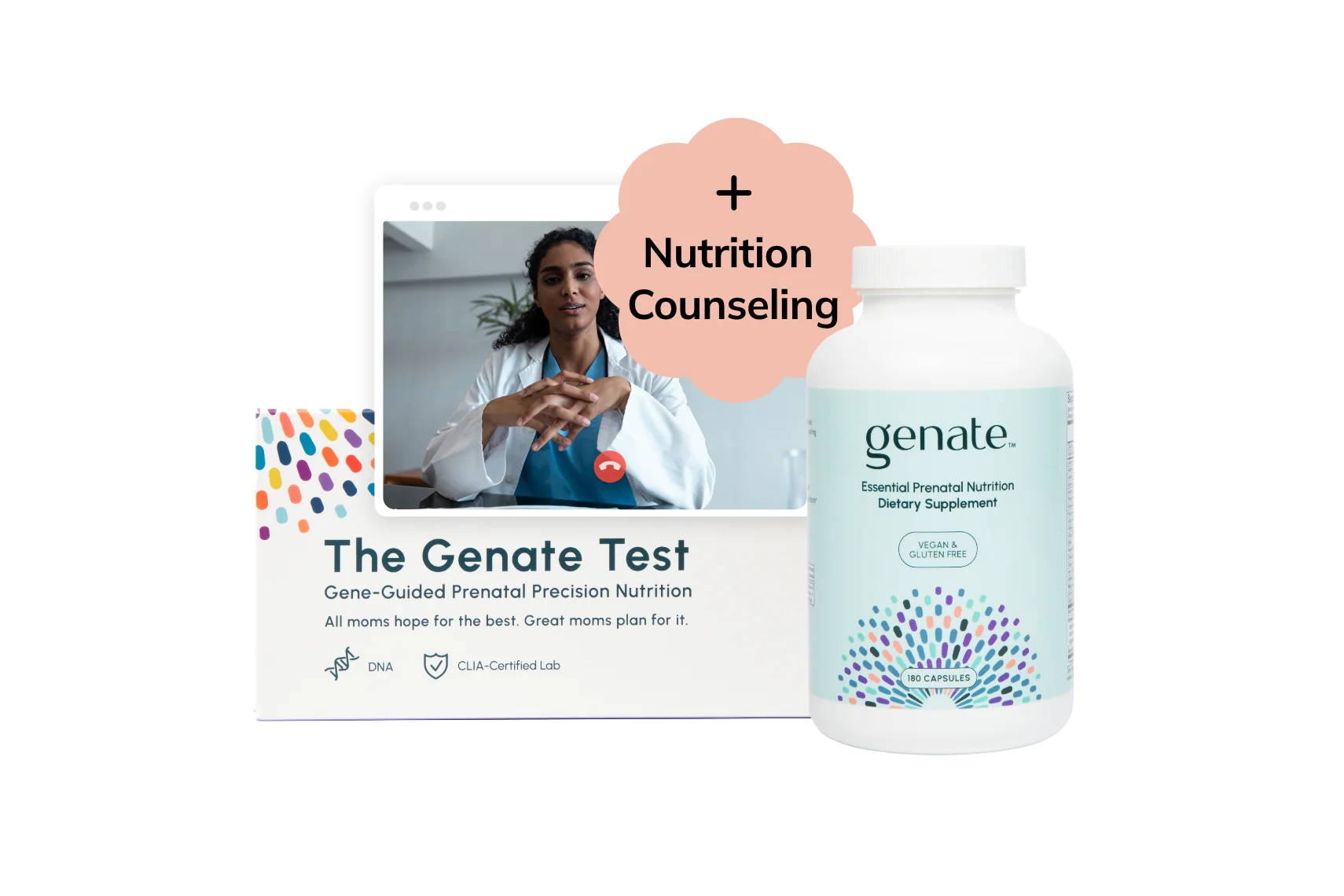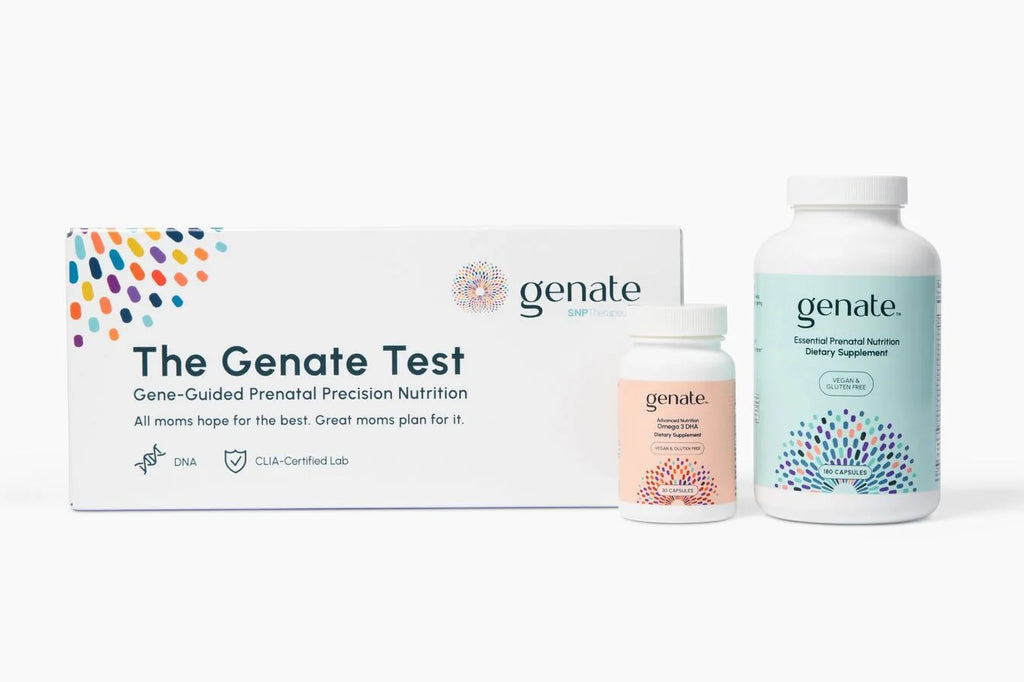Good nutrition is essential for every stage of your baby’s growth and development. But the efficiency with which your body metabolizes nutrients is partly determined by your genes, and common genetic variants can affect the metabolism of one-carbon nutrients that are critical for the development of your child’s brain and spinal cord. Genate Essential Prenatal Nutrition is a multivitamin formulated from academic research that provides women with a formulation optimized to support their baby’s cognitive development. It includes the one-carbon nutrients choline, betaine, methylfolate, and B vitamins that many women have trouble metabolizing and/or don’t get enough of in their diet.

DIET & NUTRITION
Why Should I Get Nutrigenetic Screening Before Choosing a Prenatal Vitamin?
by Genate • November 30, 2023 • 6-8 minute read
Learn how genetic testing can help you choose prenatal nutrition tailored for your body.
If you are pregnant or trying to conceive, your doctor has probably told you to take prenatal vitamins. These one-size-fits-all vitamins have many of the vitamins and minerals you need for a healthy pregnancy.
However, studies show that 70% of women have at least one genetic variant that could affect how the nutrients they eat get passed on to their babies. Therefore, instead of taking a general prenatal vitamin, you can take a DNA nutrition test to learn the best balance of vitamins, minerals, and other essential compounds that will provide optimal growth and cognitive development for your baby.
Genetic testing, such as the Genate Test, examines how your genetics contribute to potential nutritional deficiencies that could affect your baby’s growth and cognitive development. You can then work with a nutrition counselor to create a customized diet and supplement plan that supports your baby’s nutritional needs.
Discover the genetics that affect your baby's cognitive development
What is nutrigenetic testing?
Nutrigenetic testing, also called nutrigenetic screening, looks at your genes to understand how your body processes food and nutrients. It checks for specific gene variations that can affect your metabolism, absorption, and transport of nutrients.
The results of nutrigenetic screening can be used to create a customized diet plan tailored to your genetic makeup.
When is the best time to get nutrigenetic screening?
What are prenatal vitamins?
Prenatal vitamins are specially formulated dietary supplements designed to fill basic nutritional gaps and ensure that the expecting mom receives adequate nourishment for a healthy pregnancy and baby.
During your preconception or early prenatal appointments, your doctor or midwife will recommend that you take a prenatal vitamin. Most prenatal vitamins contain a combination of vitamins and minerals essential for healthy development. However, common over-the-counter prenatal vitamins do not account for your unique genetic differences in how your body uses vitamins and minerals.
This is where nutrigenetic testing can fill in the gaps by identifying any inefficiencies in your nutrient pathways. Then you can find prenatal supplements that will support optimal health for you and your baby.
Key vitamins and minerals in pregnancy
What kind of essential vitamins and minerals do you need during your pregnancy that genetics might affect? We list a few of the key factors that you might want to support with custom prenatal supplements below:
DHA
DHA is an omega-3 fat that supports the growth of a developing baby’s brain, eyes, and immune system. Studies show that DHA should be taken during all trimesters of pregnancy for the most benefit. Some women have a variant gene that reduces the transport of DHA in the body. Get genetic testing before conception to determine if you need to add more DHA to reach recommended levels for your baby to develop appropriately.
Folate
Folate, also known as vitamin B9, is a vitamin that prevents neural tube defects called spina bifida and anencephaly. Studies show that up to 30% of people have genetic variants in a protein involved in turning folic acid, the synthetic form found in supplements and fortified foods, into the active form of folate that can be used by your body. Therefore, testing of genes involved in folate metabolism can tell you if you need to take more folic acid than is typically recommended.
Early detection of genetic variants in folate pathways is essential because the neural tube is formed and closes in the first six weeks of pregnancy. Folate is also associated with the DNA methylation process, and alterations in this process have been associated with a range of maternal conditions during pregnancy, including preeclampsia, hypertension, diabetes, and pregnancy loss.
The Genate Test
Using a prenatal genetic nutrition test, we help expectant mothers understand how their diet and genetics impact their developing baby. The Genate Test focuses on five metabolic pathways and 325 genetic variants to determine how your unique genetic profile can cause nutrient deficiencies essential for fetal growth and cognitive development. With the test results and nutrition counseling provided by our team of registered dietitians, you can customize your diet and supplement intake to optimize fetal growth and your baby’s overall growth and development.
This article is not intended as medical advice to treat or diagnose any health condition but rather as educational health information for the general public. It should not be used as a substitute for individualized medical care from your healthcare provider.
Shop the Article
Save 23% today!
Genate Essential Prenatal Multivitamin + Advanced Omega-3 DHA Package
Bundle to increase savings and provide the foundational nutrients needed for optimal health and development.
From $72 per month
Save 23% today!
Comprehensive Prenatal Support Package
Genate Essential Prenatal Multivitamin + Advanced Omega-3 DHA + Phosphatidylcholine
Our most comprehensive bundle - you’ll receive our Essential Prenatal Multivitamin, Advanced Phosphatidylcholine, and Advanced Omega-3 DHA.
From $110 per month
Save 30% today!
Comprehensive Prenatal Nutrition Bundle
Buy the Genate Test and a nutrition counseling session with a Genate registered dietitian, and receive a 30-day supply of the Genate Essential Prenatal Multivitamin FREE. Purchase includes a 90-day prenatal multivitamin subscription at our best monthly price.
$309
References
Prenatal vitamins. American Pregnancy Association. https://americanpregnancy.org/healthy-pregnancy/pregnancy-health-wellness/prenatal-vitamins/ Published December 29, 2022. Accessed November 15, 2023.
Herrera E, Ortega-Senovilla H. Dietary implications of polyunsaturated fatty acids during pregnancy and in neonates. Life (Basel). 2023;13(8):1656. https://doi.org/10.3390/life13081656
Dias S, Willmer T, Adam S, Pheiffer C. (2022). The role of maternal DNA methylation in pregnancies complicated by gestational diabetes. Front Clin Diabetes Healthcare. 2022;3. https://doi.org/10.3389/fcdhc.2022.982665
Korsmo HW, Jiang X, Caudill MA. Choline: Exploring the growing science on its benefits for moms and babies. Nutrients. 2019;11(8):1823. https://doi.org/10.3390/nu11081823
Friso S, Choi S-W, Girelli D, Mason JB, Dolnikowski GG, Bagley PJ, et al. A common mutation in the 5,10-methylenetetrahydrofolate reductase gene affects genomic DNA methylation through an interaction with folate status. Proc Natl Acad Sci USA. 2002;99(8):5606–5611. https://doi.org/10.1073/pnas.062066299
Take the Genate Quiz
Take our Nutrition Quiz to learn more about your nutrition journey.
Read Our Latest Articles
Frequently Asked Questions
What are the benefits of my baby getting the proper nutrients?
What are one-carbon nutrients and fatty acids, and why are they important?
One-carbon nutrients and fatty acids are critical for brain and spinal cord development during pregnancy and through the first two years of life. Although all nutrients are important, the one-carbon nutrients choline, folate, betaine, and B vitamins, along with the omega-3 fat DHA, provide the building blocks for proper growth of your developing baby's brain. Research at Cornell and Harvard universities has shown cognitive benefits for children born to mothers who received increased levels of one-carbon nutrients during pregnancy, demonstrating that optimal nutrition during pregnancy can have lasting effects for your baby.
If I buy Genate nutrition supplements, do I still need to take the test?
Genetic testing is a personal choice, and only you can decide what’s best for you and your baby. But the Genate Test is a powerful tool for optimizing your nutrition status, as it identifies genetically-caused metabolic inefficiencies that may influence your body’ ability to make and use the nutrients critical for your baby’s cognitive development. If you have SNPs in any of the nutrient pathways tested, your Genate Report will provide personalized recommendations for optimizing your nutrition. Our registered dietitians can show you how to fill in the gaps with foods and supplementation, if needed, to make sure you’re getting the nutrition you and your baby need.








